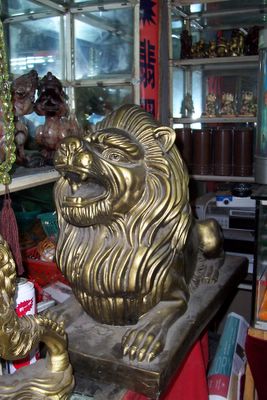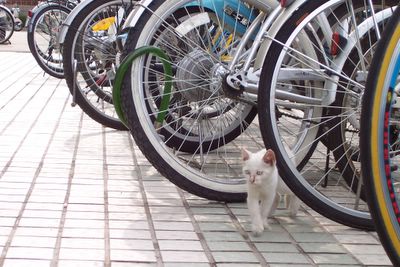An ornamental lion in a shop, for lack of a better picture:

I’ve made it through the first week of classes. Each language class lasts for an hour and forty minutes, most of which is recitation and repetition. I have two language classes a day on average, plus the Silk Road course organized by Union that meets twice a week. We have the same classmates for all of the language classes. My class consists of myself, two other Americans, two students from France (both very good at Chinese), and 6 or 7 Koreans. Nora said she has a North Korean in her class who shoots her dirty looks, as freedom-hating citizens of the ‘Axis of Evil’ generally will. The Koreans in my class have been very friendly, so I’m assuming they’re all from South Korea.
The classroom is tiny, and so are the desks. It looks sort of like the inner-city school districts that have to put classrooms in broom closets. But it works alright.
Students stay in the same classroom for all of our language classes, while the teachers move. We have three different classes, which are supposed to be reading, writing, listening, and speaking in some sort of combination. But so far there hasn’t been any difference between the three except that there is a different teacher for each. All three of my teachers are young Chinese women no older than 30, probably as young as 20. None of them are especially great at English, which doesn’t really matter since they hardly ever speak it in class anyway. The teaching style is different from Proffessor Ferry’s, but it works. I can’t tell if it’s just because we only had 3-4 hours a week at Union, while we have closer to 25 here, but I’m learning Chinese.
I’m getting more and more accustomed to the food every day. A few notes about Chinese food:
1. It is nothing like American Chinese food. Except for the rice and chopsticks.
2. They put meat in everything. I love having little bits of pork in my green beans for an added flavor (it motivates me to eat veggies), but it makes things a little tricky for vegetarians. Sometimes the servers don’t really understand the concept of being vegetarian, since it just doesn’t happen in China.
3. Everybody shares every dish at the table. The more people you go out with, the more dishes you can order, the more variety you’ll have, and the better chance that there will be something you like.
4. More often than not, beer comes in 640mL bottles. And since tapwater is not drinkable, it’s not uncommon for restaurants to just not have water, just like a place in the states may not have root beer.
5. Chinese are a lot less picky about what parts of animals they will eat. Sometimes it seems like they just took the whole pig, chicken, cow, or iguana (hey, it could be… there’s no way of telling) threw it in the grinder, cooked, and served. As a result, meat dishes are sometimes more fat and bone than actual meat. Luckily for me (I dislike fat to the point that it makes me gag), it’s not considered rude to spit food back out onto your plate.
6. Professor Ferry orders the weirdest dishes on the menu. Never judge a restaurant by what she orders (because I know everybody that reads this will someday be eating in a restaurant in Shanghai with Professor Ferry). Last night we revisited the restaurant she took us to on our first night in Shanghai because it had English menus. With Professor Ferry ordering the food, we didn’t like it. With us ordering on our own, it was the best meal we’ve had since arriving (except perhaps the Pizza Hut we just got back from). It’s really nice to have a western meal every once in a while. Not that I especially dislike the Chinese food, but every once in a while you just want to sit down and have a meal without having to make an adventure of it.
Probably my favorite place to eat is still the cafeteria on campus, just because it has such a genuine communist feel. You jostle your way through the pushy crowd to get to the counter, point at the dishes you want, and the people behind the counter slop the food onto a metal tray for you. After telling them how many liang (portion of rice) you want, swipe your card, grab two generic wooden chopsticks from the bin and sit down. Throughout the meal, if it’s crowded enough, a loud, hi-frequency megaphone blasts a repetitive message in Chinese telling people that their special order food is ready. Nothing like pushy lines, food on metal trays, and repetitive megaphones to make you feel like a true socialist.
Everything here is so ridiculously cheap, it feels almost like you’d be stupid not to buy everything you see. When 100 kuai is little more than 12 dollars, it feels like monopoly money. It’s going to take a lot of self-control not to overspend here. DVDs, 12 kuai? I’ll take 15! And so on. Last week I bought an abacus. It’s really cool and authentic looking, but what the hell am I gonna do with an abacus? Professor Ferry encourages us to buy stuff and sell it off in the states for a profit. It’s amazing how coming to a communist country can turn you into such a capitalist. Anybody want a pearl necklace? I can get you one at a price…
Tara’s boyfriend Patrick is visiting this week. I offered to help Tara (whose Chinese knowledge is still limited to “ni hao ma”) go to pick him up at the airport on the condition that we would take the bullet train back. So we did. Pudong international airport is at the very far edge of the new development zone, about an hour from the city center. In the master plan the Chinese have in mind for Shanghai, Pudong will be the largest airport hub in Asia, about 4 times larger than it already is. As Professor Ferry warned us, the bullet train goes from the airport to essentially nowhere. The only difference is that this nowhere is about a 45 minute cab ride closer to the city than the nowhere that the airport was built on. Of course by the time you buy tickets, wait for the train, take the 8-minute ride, get off, and find a cab to the place you actually want to go, it probably takes just as long as just getting a cab in the first place. But at the rate that Shanghai is growing, the end point will probably be indistinguishable from downtown anyway. And besides, it’s a bullet train. Flying on a cushion of air at 500kph around wide banked corners… how could you resist? It was even cooler than it sounds.
When we got to the end of the train, we expected a struggle to find a cab. Instead we found cab drivers in a struggle to find passengers. We came down the stairs where the cabs were, and two drivers were waiting there for us. They both started talking to us. When we started to go with one, a smaller, older man, the other man started talking to us again. The older driver slammed his fist on his car and spat out some extremely angry-sounding Chinese at the other. The other shot back, and the first (keep in mind this is the little old one) took off his glasses and ran at the other, pushing him hard. The physical confrontation attracted a worried looking crowd of more cab drivers as the three of us backed away slowly. An opportunistic young driver approached us and we snuck off into his cab. I told Tara and Patrick to get in quickly, before the two original drivers saw us and started another fight, and our new driver seemed to understand me, nodding nervously at me. He ended up ripping us off for the cab ride back to school, for which he wanted to charge us 200 kuai. After I told him that the ride from the school to the airport was only 140, he agreed on 130, but it was still a rip off considering the ride was less than half as long.
I just stood outside on my balcony and watched the fireworks for the moon festival. Nice.
















